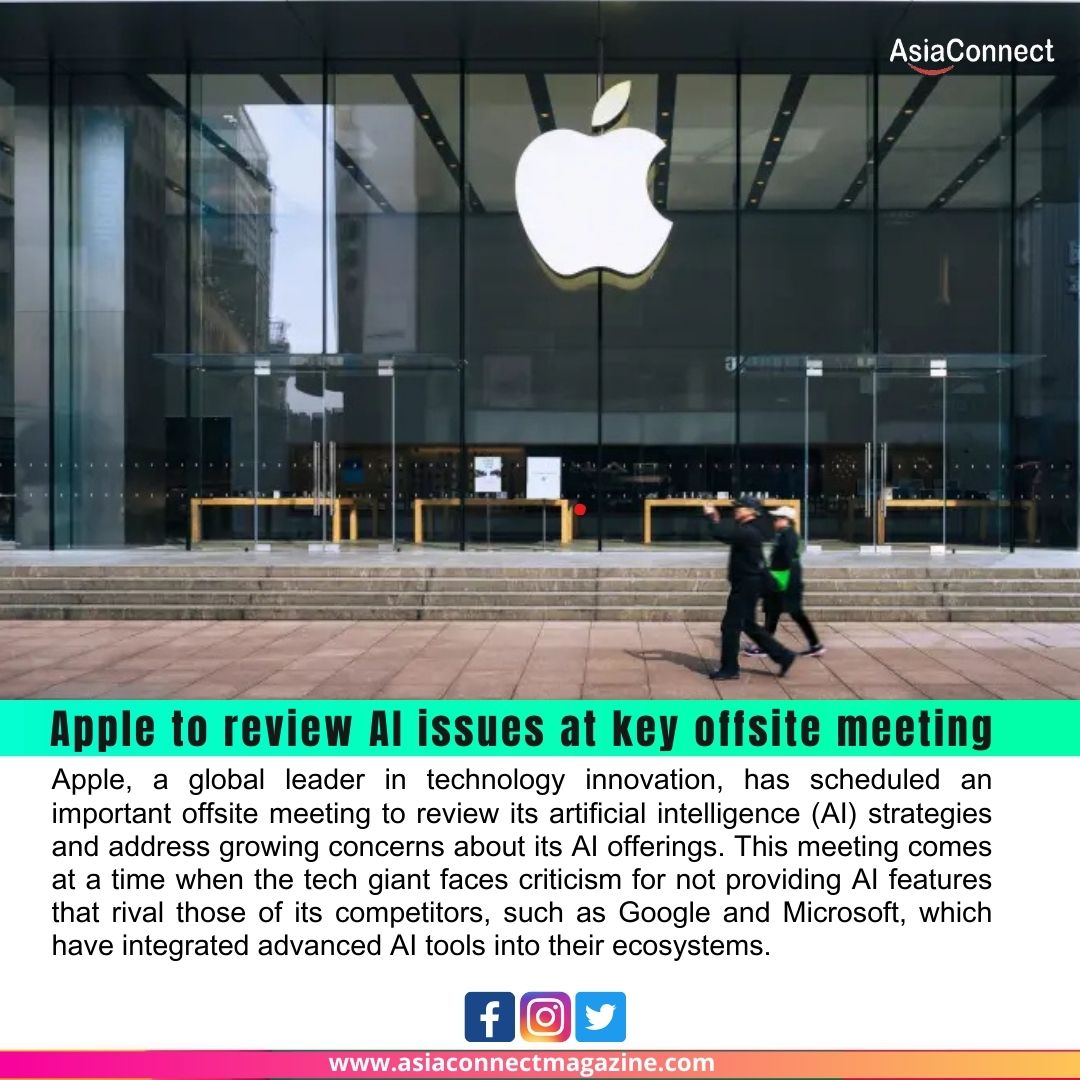Apple, a global leader in technology innovation, has scheduled an important offsite meeting to review its artificial intelligence (AI) strategies and address growing concerns about its AI offerings. This meeting comes at a time when the tech giant faces criticism for not providing AI features that rival those of its competitors, such as Google and Microsoft, which have integrated advanced AI tools into their ecosystems.
Apple’s AI Struggles: Criticisms and Comparisons
Apple has long been at the forefront of technological advancements, with its seamless hardware, user-friendly software, and exceptional ecosystem. However, when it comes to AI, Apple has lagged behind its major competitors. While Google has established itself as a leader in AI research and development, particularly with its Google Assistant, Google AI, and its advancements in generative AI, Apple’s AI offerings have been seen as relatively basic by some users and analysts.
Despite the introduction of Siri, Apple’s virtual assistant, in 2011, critics argue that Siri has not evolved as quickly as Google Assistant or Amazon’s Alexa. Apple has also faced criticism for not integrating more advanced AI capabilities into its products, which could have enhanced the user experience in areas like natural language processing, image recognition, and smart automation.
Apple’s reluctance to implement AI-driven features at the scale of its competitors may stem from its prioritization of privacy and security. Apple has long emphasized that its user data remains secure and private, a stance that sets it apart from other tech companies that rely on data to improve their AI models. However, this commitment to privacy could be slowing the development of some of Apple’s AI technologies.
The Importance of the Offsite Meeting
At the upcoming offsite meeting, Apple’s leadership team is expected to engage in high-level discussions about how to address these AI shortcomings and ensure that the company remains competitive in the fast-evolving tech landscape. The meeting will likely include a review of Apple’s existing AI initiatives, such as Siri, Apple Neural Engine, and CoreML, which are integral to the company’s AI strategy.
Apple’s leadership will likely seek to identify ways to enhance the performance of Siri and other AI-driven features, including improving its natural language understanding and deepening its integration across devices and services. Apple could also focus on accelerating the development of AI features that enhance user privacy while still competing with other companies in the market.
Apple’s AI Investments and the Path Forward
Despite its struggles in the AI space, Apple has not been inactive. The company has made substantial investments in AI research and development, acquiring several AI startups over the years. In 2020, Apple purchased Xnor.ai, a startup specializing in AI-powered edge computing, which is designed to run machine learning algorithms directly on devices rather than relying on cloud computing. This aligns with Apple’s philosophy of protecting user privacy by processing data locally rather than on external servers.
Apple has also been heavily investing in machine learning (ML) and computer vision technologies, which power features like Face ID, Image Recognition, and Camera Enhancements. These technologies have already set Apple apart in terms of security and user experience, but as AI continues to evolve, Apple will need to do more to stay competitive.
The company has also been increasing its presence in the AI research community, with its AI and Machine Learning division continuing to grow. Apple’s developer ecosystem provides tools such as Core ML and Create ML, which enable developers to integrate AI capabilities into their apps more easily. However, the company still faces challenges in expanding the AI-driven features that can reach the average user in a more seamless way.
A Competitive AI Landscape
The AI landscape is rapidly shifting, with tech companies scrambling to develop advanced AI systems that are capable of deep learning, predictive analytics, and even generative AI, the technology that powers systems like OpenAI’s GPT and Google’s Bard. For Apple to keep up with its competitors, the company will need to rethink its approach to AI and introduce more cutting-edge technologies that match or surpass those of its rivals.
With the increasing importance of AI in everyday technology, Apple cannot afford to ignore the growing demand for smarter, more personalized user experiences. The upcoming offsite meeting could mark a turning point for Apple as it looks to refocus its efforts on AI innovation and ensure that its products remain relevant in a highly competitive market.
Looking Ahead
As Apple moves forward with its AI initiatives, it will likely take a more aggressive approach to incorporating AI across its hardware, software, and services. A more robust AI strategy could help Apple expand its ecosystem, enhance the user experience, and meet the growing expectations of customers who are increasingly looking for smarter, more intuitive devices.
In conclusion, Apple’s upcoming offsite meeting on AI issues is a critical moment in the company’s journey to strengthen its position in the AI market. By addressing the gaps in its AI offerings, Apple has the opportunity to reclaim its leadership in innovation and continue to provide users with cutting-edge technology while maintaining its commitment to privacy and security. How Apple responds to these challenges will determine the future of its AI strategy and its competitiveness in an increasingly AI-driven world.





